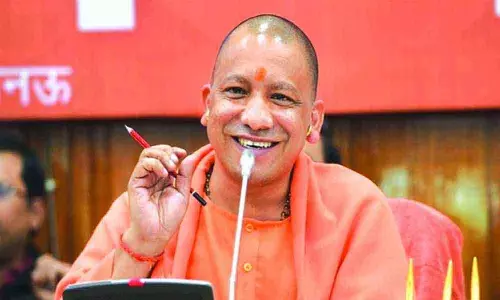
Justice delayed is justice denied
text_fieldsThe winter session of the Parliament was a virtual washout with both the Houses creating a ruckus and stalling the proceedings continuously. The passage of Rights of Persons with Disability Bill was the only legislative action that was unanimously agreed by both the Lok Sabha and Rajya Sabha. The Bill is a milestone in the attempts to ensure equality of the citizens and aims at social development and securing the rights of the disabled persons. The Bill that was initiated during the tenure of second UPA government was passed unanimously after 119 amendments including the 59 changes directed by the Parliamentary committee.
 The UPA government prepared the Bill upon the recommendations of Sudha Kaul Committee and is brought to comply with the recommendations of the UN Convention on Rights of Persons with Disabilities. While a provision of five percent reservation has been placed in the educational sector, a four per cent reservation is allowed in government services and five percent for private sectors. The number of categories of disabled persons has been increased to 21 instead of 7 covering all disabilities including blindness, poor vision, cured leprosy, hearing impairment, mental illness, autism spectrum disorder, cerebral palsy, muscular dystrophy and chronic neurological conditions. The Bill grants the right to entry to public places that were not in force before to the differently abled. It directs that the public places including buildings and institutions should have facilities to cater to the special needs of the handicapped. It also mandates the public transport system to have amenities that ensure smooth travel for the disabled, within two years. There are provisions for forming regulatory bodies with commissioners appointed at the central as well as state levels to find solutions to the grievances and to safeguard the welfare of the disabled persons. While the Bill imposes a fine along with imprisonment of at least six months up to two years for discriminating against the disabled, misusing the law to obtain benefits is also a punishable offence.
The UPA government prepared the Bill upon the recommendations of Sudha Kaul Committee and is brought to comply with the recommendations of the UN Convention on Rights of Persons with Disabilities. While a provision of five percent reservation has been placed in the educational sector, a four per cent reservation is allowed in government services and five percent for private sectors. The number of categories of disabled persons has been increased to 21 instead of 7 covering all disabilities including blindness, poor vision, cured leprosy, hearing impairment, mental illness, autism spectrum disorder, cerebral palsy, muscular dystrophy and chronic neurological conditions. The Bill grants the right to entry to public places that were not in force before to the differently abled. It directs that the public places including buildings and institutions should have facilities to cater to the special needs of the handicapped. It also mandates the public transport system to have amenities that ensure smooth travel for the disabled, within two years. There are provisions for forming regulatory bodies with commissioners appointed at the central as well as state levels to find solutions to the grievances and to safeguard the welfare of the disabled persons. While the Bill imposes a fine along with imprisonment of at least six months up to two years for discriminating against the disabled, misusing the law to obtain benefits is also a punishable offence.
The Bill in reality is a delayed justice. It’s a mark of cultural progress to create an environment that ensures equality and self-confidence of the differently-abled in public places and social circles. It’s not only due to the stringency of the laws that the parking spots reserved for the handicapped aren’t encroached upon in cities even during peak hours; it’s also due to the respect and tolerance towards the fellow beings. On the other hand, looking down upon the disabled persons and ill-treating them still persist in societies.
 The contempt towards the handicapped begins right in our word usages and adages. Freelance Writer Activist and Advocate Malini Chib, who penned One Little Finger, said that she felt excluded by the country because of her disability. She left for London with her mother due to this alienation. World famous social scientist and academician Dr Anita Ghai was made to ‘crawl’ to the passenger coach after deboarding an Air India plane as the airline failed to arrange a wheel chair for her due to "security" reasons. Prime Minister Modi had said last year that the term ‘divyang’ should be used in place of ‘viklang’ for the physically challenged people. As the various organisations of the disabled suggest, what matters is not how they are addressed, but the behaviour and attitude of the government and fellow beings towards them. Laws should be made to support and empower them.
The contempt towards the handicapped begins right in our word usages and adages. Freelance Writer Activist and Advocate Malini Chib, who penned One Little Finger, said that she felt excluded by the country because of her disability. She left for London with her mother due to this alienation. World famous social scientist and academician Dr Anita Ghai was made to ‘crawl’ to the passenger coach after deboarding an Air India plane as the airline failed to arrange a wheel chair for her due to "security" reasons. Prime Minister Modi had said last year that the term ‘divyang’ should be used in place of ‘viklang’ for the physically challenged people. As the various organisations of the disabled suggest, what matters is not how they are addressed, but the behaviour and attitude of the government and fellow beings towards them. Laws should be made to support and empower them.
The disabled and their families have always experienced the intolerance of the upper-class mentality that considers reservation as benevolence. And the picture is not different even in Kerala that boasts of a highly civilised society. The miseries of those with autism and cerebral palsy as well as their families, getting alienated from celebrations and festive occasions even at their homes let alone experiencing a social life, isn’t uncommon. The need for legal battles in Kerala for implementing the employment reservation for the physically handicapped that came into effect in 1995 and waiting until 2016 to agree upon the appointments are alone sufficient to gauge the state’s attitude and cultural standards.
 The Bill should aim at providing a social environment of equality and self-esteem for the differently abled both physically as well as mentally starting right from the rudimentary level to all public spaces. They should have the necessary facilities and access to tourist spots and places of worship without any assistance and live normal lives. There should also be provisions arranged at public places for fulfilling one’s primary needs. The 1995 legislation clearly ascertains that merely forming laws without ensuring a comprehensive inclusiveness of all citizens would end as futile move.
The Bill should aim at providing a social environment of equality and self-esteem for the differently abled both physically as well as mentally starting right from the rudimentary level to all public spaces. They should have the necessary facilities and access to tourist spots and places of worship without any assistance and live normal lives. There should also be provisions arranged at public places for fulfilling one’s primary needs. The 1995 legislation clearly ascertains that merely forming laws without ensuring a comprehensive inclusiveness of all citizens would end as futile move.























